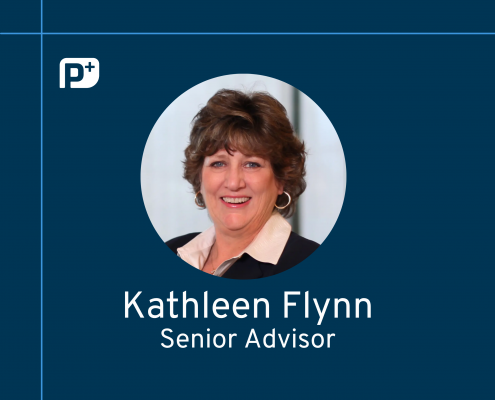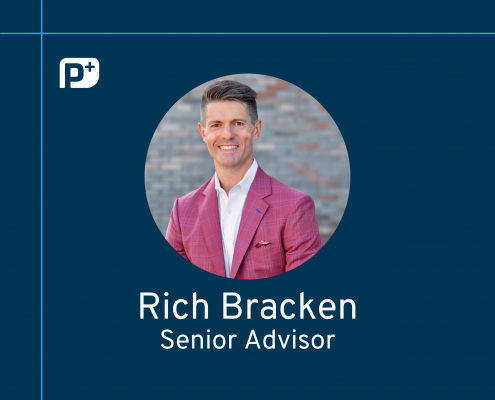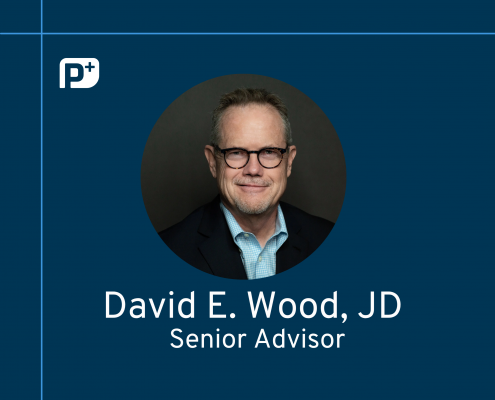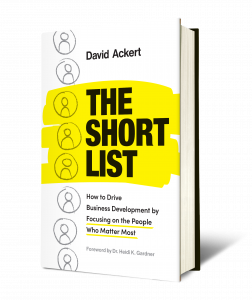“Making an Impact in the Short-term” with Maggie Garden
Maggie Garden, Director of Business Development at Shipman and Goodwin, was a recent guest on The Market Leaders Podcast, where she spoke to David Ackert about making an impact in the short-term.
For the last 20 years, Maggie has been in marketing and communication-type roles and has helped companies with their marketing and strategic planning, corporate communications, client development, and more. She shared, “My passion is definitely building relationships, fostering those relationships, and maintaining them both personally and professionally. I’ve been at Shipman and Goodwin for about three months. I work directly with several practice groups, but also work on strengthening some of the firm’s strategic and industry partnerships and on many other marketing and business development projects.”
Initial Impressions and Short-Term Needs
David noted that the initiatives Maggie mentioned are long-term. He asked her to talk about some of the short-term needs she identified when she first joined Shipman and during her first few months at the firm.
She said, “When I first arrived, I was immediately impressed with the marketing and business development team that was already in place and the support that they provided to the attorneys and the firm as a whole. In fact, I think that’s what attracted me to join Shipman in the first place is the marketing and business development team. Everybody has their own unique set of skills and talents that they bring to initiatives.”
Maggie explained that in her previous law firm role, she was the sole marketing and business development person, so she was pleased to become part of a team. She added, “As soon as I joined Shipman, I jumped right into a business development initiative that we’re calling the Shipman Learning Series that’s about increasing awareness of marketing and business development initiatives. We’re offering our team helpful tips and hints and best practices on a variety of levels.”
She explained that one aspect of the initiative Is providing content using multiple mediums, so there’s something for everybody, whether webinar, short video, email, or podcast. Maggie said, “We know everybody’s busy. So, we’re making sure that we’re providing tools in bite-size pieces and if someone can’t join us in real time, we also have all the content filed online so they can view it at their convenience.” She noted that her team recently created a learning series about LinkedIn, starting with how to build a great profile, but also about how to utilize the platform to help build your brand and your business.
David observed that the opportunity to close the business development skills gap among lawyers at Shipman was low-hanging fruit that’s available at nearly every firm for marketers and business developers professionals to make an impact. He was interested in knowing what the response was to the Learning Services initiative.
Maggie responded, “The business development team has been a part of Shipman for many years. We have marketing people, people who work on proposals, and people who do a lot behind the scenes. So, when I came on board, I think I was just an extension of that, and I brought a lot of business development experience. I would say the Learning Services initiative has been well received. We’ve worked on it together as a team and it’s in line with the way the team at Shipman is always thinking about ways to better their employees, their teams, and especially the attorneys.”
Creating a Strong Foundation
Maggie added that another thing Shipman does on a regular basis is meet with associates to discuss their business development plans. She explained, “For instance, when attorneys first come on board, we will meet with them and ask where they would like to see their practice in five years and what industry organizations they can be active in. We help them with a business development plan, too, but not only do we do the plan, but we help them along the way with the steps so that they can achieve their goals.”
David noted that Maggie is clearly building on some of the structure that Shipman already had in place by the business development team. He asked her to talk about some elements of the structure – in addition to meeting with associates about their business development plans – that help create a strong foundation.
“I think the business development meetings are huge,” Maggie shared, “because the team’s not just meeting with associates straight from the get-go. They meet with them at year one, then again at year five, and they continue that process. And they also offer a wide variety of ways for attorneys to get their names and practice groups out there – whether via webinar, podcast, or marketing collateral – and make sure that our attorneys are involved in industry organizations so that they’re able to meet potential business partners and engage with existing business partnerships. There’s a wide variety of things that we do here, and I find it awesome to have an actual team that helps attorneys do things so they can focus on what they do best, which is practice law.”
Breaking Down Silos and Operationalizing Business Development
Next, David asked Maggie to talk about two things many firms struggle with when it comes to putting a structure to business development – breaking down silos between practice groups and operationalizing business development.
Maggie responded, “I think you’re absolutely right. A lot of law firms, and businesses in general, struggle with that. I think at Shipman we work with our lawyers to cross-educate internally amongst practice groups and to help everybody understand what the other areas of practice do.” She added that an overall trend at the firm is that each of our practice groups can help each other.
She continued, explaining, “For example, we have a cannabis practice. Obviously, with cannabis, you’re going to need the real estate practice involved because there’s zoning. You’re going to need labor and employee relations involved because people are going to have a staff. We have a variety of ways of educating our team, whether it’s a podcast internally, sending out marketing collateral, or just encouraging the attorneys to come together from multi-practice groups and introduce different ways that they can help our clients. It’s just keeping lines of communication open and having an open-door policy where attorneys can go back and forth between each other’s offices, whether virtually or in -person.”
David noted that beyond just open-door policy, which suggests more of a passive organic approach in which sometimes people don’t always step through the open doors, it seems Maggie and her team at Shipman drive the conversations, which is the key to efficacy.
Ensuring Results
Returning to operationalizing business development, David asked how Maggie ensures the talk results in action, and that the business development team has some visibility into the activities.
Maggie said, “With technology and there are a number of technology tools that we utilize to help us with these efforts. But one thing I will say about technology is it’s not necessarily the platforms themselves. I think we’ve seen some of our greatest successes when we utilize these tools to their maximum benefits.”
She continued, “What I mean by that is we actually use analytics to connect the dots. So, it’s not just about putting out great content or having the technology to do so, although that is important. It’s also seeing who’s reading or watching the content, and who’s using the information to make sure that we’re making business contacts and building relationships. So, if we have a webinar, we can pull analytics to see who attended, who submitted questions, and then follow up with calls, emails, or even additional content.”
Maggie added, “I would think if you’re attending a webinar, you have interest in the topic, right? And if someone asks a question, they put it out there they have an interest and a need, so follow up. Even if it’s simply picking up the phone afterward and opening up the lines of communication, people remember that. Follow-up is a really key point to proving whether a technology platform is beneficial.”
Bringing Humanity Back to Business
Pointing out that getting lawyers to pick up the phone is often easier said than done, David asked Maggie about what philosophy she shares with them or tries to help them adopt to make interactions more natural and perhaps a little more palatable.
Maggie said, “I think it really comes back to bringing humanity back to business. I think sometimes we overthink and put way too much thought into finding the perfect pitch, plan, or email. When it comes to engaging a client or retaining an existing relationship, a well-executed plan has its place, but I’ve always found success in building and maintaining relationships with a component of humanity. We all have our various professions – business development professionals, lawyers, HR representatives, IT professionals – but we’re all human beings first. And I think sometimes that gets lost in the business world.”
She continued, “If you form a solid relationship with a client, it’s only going to be beneficial. So, if you have to have a difficult conversation but you have the foundation there, it’s going to make those bumps in the road a little bit easier to navigate.”
Maggie shared a personal example about the first client she ever brought in. “I met her at a conference, and it took me over a year before I ever saw the first referral. But she was my client for 16 years after that. She moved from company to company, and everywhere she went, she gave me the business.”
She noted that she has a client-facing role in Shipman as well. “I’m not just behind the scenes in business development. I’m not licensed to practice law and I can’t always cite case law on a whim, but I can tell you where my clients’ kids are going to college in the fall, or the names of their pets, or their favorite football team. These things matter. Connections matter. And I’ve always approached business with the belief that people won’t always remember what you say, but they’re always going to remember how you make them feel. If you can make a client feel engaged and important from the very beginning, it’s only going to help you in your long-term relationship.”
David observed that relationship building seems to come naturally to Maggie, but many lawyers just aren’t wired that way. They’re more technical in the way they think and speak and it’s difficult to get them to adopt an emotionally intelligent, EQ-oriented way of being. He asked Maggie to share how she’s been successful in coaching or working with those kinds of lawyers.
She said, “I would agree that not everybody is going to be comfortable in that environment, and I think it’s important to recognize that some people might be better at an email than a phone call. You don’t want to force something on somebody that’s going to make them uncomfortable because it’s not going to be good for either side of the conversation. Whether it’s written, or over the phone, you want to make sure that the person is comfortable.”
She went on to explain, “What we try to do as a business development team is to share with them the benefits of networking and building relationships but you’re still going to have those who are just going to want to focus on the law. We just make sure that within our various practice groups, we do have attorneys that want to go to the networking events, and that want to pick up the phone. The attorneys that are good in client-facing roles, we get involved in webinars, podcasts, and going to events. And, for the people that prefer to stay behind the scenes and with electronic communication, we work with them on how they can build their success in a way that they’re comfortable.”
Early Challenges
David then asked Maggie, being fairly new in her role at Shipman, what her transition has been like and if there have been any challenges inherent to the process.
“I came from a much smaller size firm,” she shared. “So, there was a little bit of an intimidation factor when I came to Shipman. I was excited to start, but a few weeks in, I had a little bit of a panic thinking I didn’t know what I was doing, I didn’t know all the practice areas, and I didn’t know all the people. And that caused some anxiety for me.”
But, she continued, “I just took a moment and a breath and realized that 16 years ago when I started my former job, I didn’t know the people or the practice either. And there was a time where I really feared making mistakes. Now, I think making mistakes is something I strive to do on a regular basis. It doesn’t intimidate me anymore. I’ve come to realize that mistakes and so-called failures are where there’s a huge opportunity for growth. These are the things that can push you past your comfort zone and some pretty incredible things can happen from them. You can learn and grow in ways that you wouldn’t if you stayed in your comfort zone.”
Maggie shared that she leaned into her anxiety and the unknown. She added, “Now I’m not calling a mistake a misstep, I’m calling it a Cha Cha. I’m growing and learning and in a place where I feel safe doing that because I have people around me that are supporting me and helping me through the process. So, I would say lean into the discomfort and realize that you’re going to grow, and great things are going to come out of it. I’m not living by fear, I’m living by learning and growing, and I’m feeling pretty good about it.”
Recommendations for New Leaders
As a final question, David asked Maggie what recommendation she has for someone who’s landing in a new role and especially a new leadership role at a firm.
Maggie responded, “It’s really interesting that you ask that question because when I was interviewing with Shipman, I similarly asked what their advice would be if I landed at the firm and took this job. I’ll never forget one of the managing partners said, I don’t expect you to bring in a million dollars worth of business in your first six months or even your first year. I expect you to come and get to know everybody, get to know the people, and get to know the practice areas. And that got me thinking about getting to know humans and what makes them tick, not just professionally, but personally. So, I would say to build your team and to build and foster your relationships. That’s what’s been successful for me. I feel like I’ve landed very softly and comfortably here by immediately seeking out inter-office relationships with everybody at the firm from the top managing partner to the individuals that help me out in IT to my wonderful team. Just build those relationships and learn about the people that you’re working with – learn what makes them grow personally and professionally, and it’s all going to be fine from there.”







